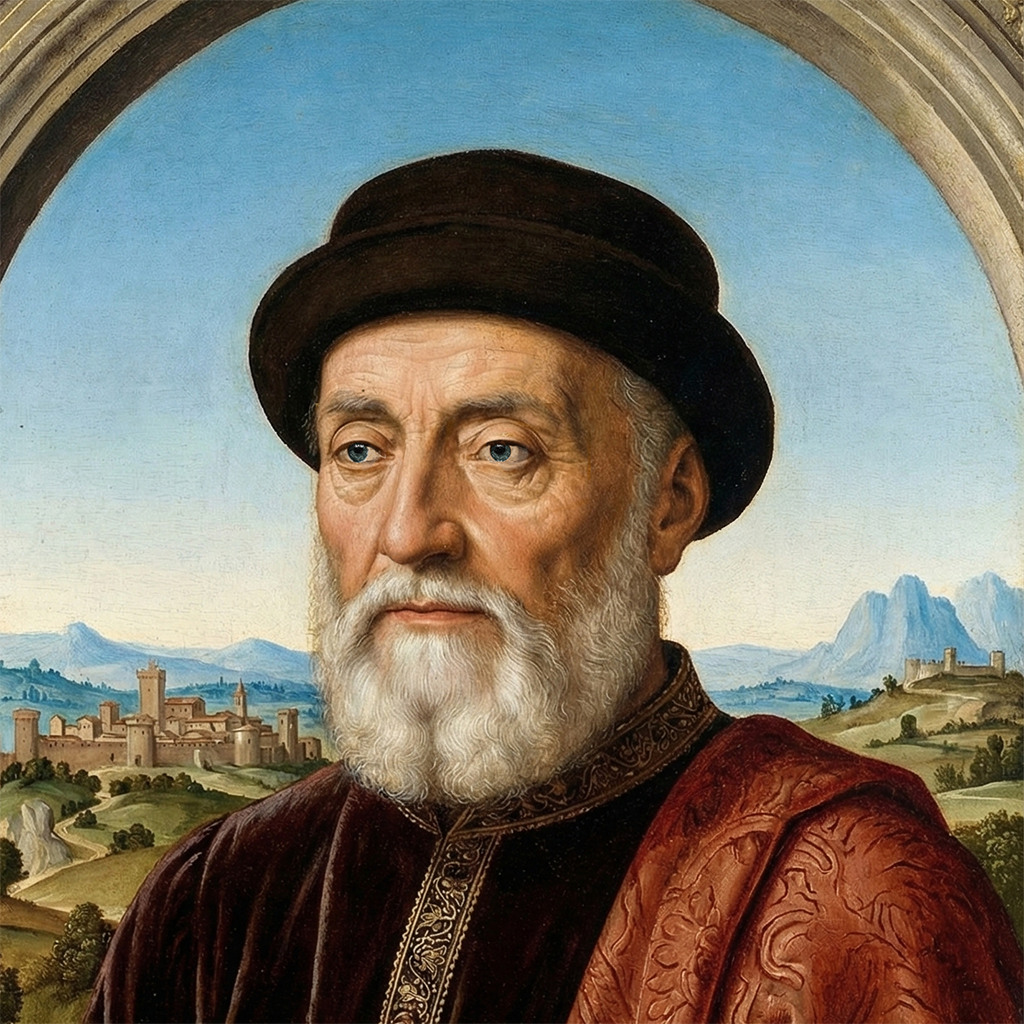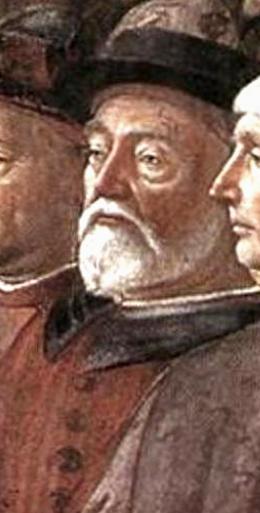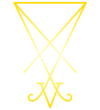John Argyropoulos
Great Teacher

John Argyropoulos, sometimes known as Giovanni Greco (John the Greek), was an eminent Greek academic and translator of note who brought much of Plato and Aristotle’s writings to Renaissance Italy in translating them to Latin. He was also a major teacher and academic of note who served the Gods in helping the initiates of the Florentine Academy. We honor him strongly due to his sacrifices in helping us leave the apex of enemy power.
EARLY LIFE
Argyropoulos was known as prodigious from an early age and soon became a teacher and deacon of certain notoriety in Constantinople. At a rather young age, he became a deputy of the Despot of Morea, where he learned about Plethon.
Argyropoulos’ knowledge of Christianity could be described as encyclopedic. He could freely draw on both sides of the church, and as a highly literate man exploited any attempt to understand both Greek and Latin sources in a novel way. Ironically, it was this depth of knowledge that began to lead him internally away from both churches and towards the hidden power, a process that intensified as he made his way back to Constantinople.
At this point, Constantinople was on the verge of being conquered by the Ottoman Turks who had become the dynamic force on the Balkan peninsula. The level of civic decay in the great city struck Argyropoulos as extremely dangerous. Beyond that, he received a frosty reception when homeward-bound, as many Orthodox individuals acting on the authority of the Ecumenical Patriarchate deemed him a heretic for his role in the mission to Florence.
COUNCIL OF FLORENCE

In 1438, he was selected to become one of the members sent to the Council of Florence to unite the Orthodox Church with the Roman Catholic Church. He became an associate of Plethon. For five years, he spent time studying Theology in Florence at the University of Padua, eventually becoming a Doctor in the subject.
It struck him as fully absurd that on the eve of the destruction of the Roman Empire, there was still an obsessive religious conflict. On the other hand, in Italy, he had gained a certain cachet to the church in his role at the Council. This reputation he gained allowed him to act under a certain cover of mystery when operating in the learning groups of the Florentine Academy. As a proven ‘convert’, he had a certain social credit that natives indulging in Platonism did not have.
Under the aegis of Cosimo de Medici, he also became the head of Greek learning at the official Florentine Studium, a department of the university of the city. In all, he translated the Nicomachean Ethics, the Physics, the Metaphysics, De Anima, Posterior Analytics, Rhetoric and many other important Aristotelian texts to Latin, ensuring their safety after the sack of Constantinople.
THE GREAT TEACHER
Argyropoulos also gave many speeches to students and helped them understand the finer aspects of the authors of Antiquity. As a teacher in Florence, he taught Lorenzo de'Medici and influenced thinkers like Marsilio Ficino and Pico della Mirandola. Numerous other famous scholars came from his school such as Palla Strozzi, Poliziano and Johann Reuchlin.
Teachers owe a lot to Argyropoulos’ methods of transmitting knowledge and novel manner of approaching the subject. His course at the university was considered pioneering, as his students, taking notes during the lesson, would later go home and submit their questions and concerns to him. This contrasted heavily with the dictatorial and one-sided style of the time in teaching, a technique he took from Socrates himself.
As many were reacting against the medieval scholastic tradition of Aristotle, his Aristotelian translations helped balance the dominance of Plato in Renaissance philosophy, who had become en vogue due to Plethon’s elaborations about him and convinced many Italians that the scholastic interpretation had many defects. The translations also showed that the continuity between the two great authors was more than what had been assumed.
Argyropoulos’ efforts in translating scientific tracts quickly contributed to the development of science as a whole. His translations of Aristotle’s Physics and Cosmology were instrumental in early Renaissance natural philosophy, laying groundwork for later scientific debates leading to Galileo and Newton’s elaborations on physics.
He also went to the court of the Hungarian king Matthias Corvinus to teach Greek in that realm but did not stay there for long, returning to Rome. The esteemed teacher was one of the main promulgators of Greek learning and teaching the language in Italy around the Renaissance, a role he continued to play up to an advanced age and in advanced poverty, having to rely on the contemptuous “assistance” of Sixtus IV who left him in dire straits that he was compelled to sell musical instruments.
BIBLIOGRAPHY
Byzantine Aitoloakarnania, Athansios Pailouras
"Argyropulus, John". Encyclopædia Britannica. Vol. 2 (11th ed.)., Hugh Chisholm
CREDIT:
[TG] Karnonnos

 አማርኛ
አማርኛ العربية
العربية বাংলা
বাংলা Български
Български 中文
中文 Čeština
Čeština Dansk
Dansk Deutsch
Deutsch Eesti
Eesti Ελληνικά
Ελληνικά Español
Español Français
Français हिन्दी
हिन्दी Hrvatski
Hrvatski IsiZulu
IsiZulu Italiano
Italiano 日本語
日本語 Kiswahili
Kiswahili Magyar
Magyar Македонски
Македонски नेपाली
नेपाली Nederlands
Nederlands فارسی
فارسی Polski
Polski Português
Português Română
Română Русский
Русский Slovenščina
Slovenščina Suomi
Suomi Svenska
Svenska Tagalog
Tagalog Türkçe
Türkçe